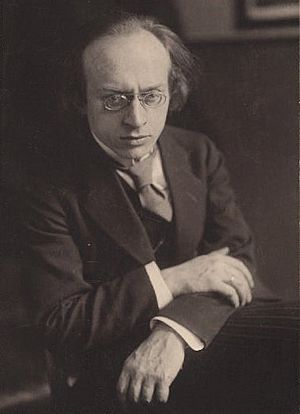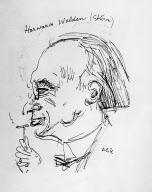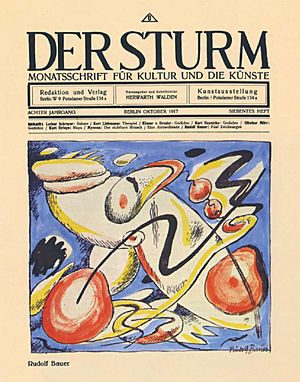Herwarth Walden facts for kids
Herwarth Walden (whose real name was Georg Lewin) was a very important German artist and expert in many different art forms. He was born in Berlin, Germany, on September 16, 1879. He passed away on October 31, 1941, in Saratov, Russia.
Walden is known as one of the most important people who discovered and helped new art styles. These styles, like Expressionism, Futurism, and Dadaism, were part of the "avant-garde" art movement in the early 1900s. He is most famous for starting an Expressionist magazine called Der Sturm (The Storm).
Life and Work
Herwarth Walden first studied music, learning composition and piano. But he loved all kinds of art. So, he became a musician, a writer, a critic, and even owned an art gallery.
He was best known for creating Der Sturm (The Storm). This was a magazine and publishing company that started in 1910. Two years later, he opened an art gallery with the same name.
Walden found and supported many young artists who were not yet famous. These artists worked in different styles, like the Blaue Reiter group and Italian Futurism. Some of them later became very well-known, such as Oskar Kokoschka and Georg Schrimpf.
He also helped many poets, including August Stramm. The way he encouraged writing became known as 'Wort-Kunst', which means 'Word-Art'.
From 1901 to 1911, Walden was married to Else Lasker-Schüler. She was a leading German Expressionist poet. She gave him the name "Herwarth Walden." She got the idea from a book by Henry Thoreau called Walden, or Life in the Woods.
In 1912, he married a Swedish painter named Nell Roslund. Later, in 1919, he joined the Communist Party. He divorced his second wife in 1924.
In the 1930s, times became difficult in Germany. The economy was bad, and the Nazi Party gained power. This made it hard for Walden to continue his work.
In 1932, he married again. Soon after, he left Germany because he was in danger from the Gestapo (the secret police). He moved to Moscow, in the Soviet Union. There, he worked as a teacher and publisher.
However, his support for new and modern art styles made the Soviet government suspicious. He had to explain many times that his art ideas were not connected to fascism. Sadly, Walden was arrested and died in a Soviet prison in Saratov in October 1941. His death was later confirmed by the International Tracing Service.
Works by Herwarth Walden
Here are some of the works Herwarth Walden created:
- Der Sturm (Magazine, 1910–1932)
- Dafnislieder für Gesang und Klavier (Songs, 1910)
- Das Buch der Menschenliebe (Novel, 1916)
- Die Härte der Weltenliebe (Novel, 1917)
- Expressionismus: Die Kunstwende (Essays, 1918)
- Kind (Drama, 1918)
- Menschen (Drama, 1918)
- Unter den Sinnen (Novel, 1919)
- Die neue Malerei (Essays, 1920)
- Glaube (Drama, 1920)
- Einblick in Kunst (Essay, 1920)
- Sünde (Drama, 1920)
- Die Beiden (Drama, 1920)
- Erste Liebe (Drama, 1920)
- Letzte Liebe (Drama, 1920)
- Im Geschweig der Liebe (Poems, 1925)
- Vulgär-Expressionismus (Essay, 1938)
See also
 In Spanish: Herwarth Walden para niños
In Spanish: Herwarth Walden para niños




